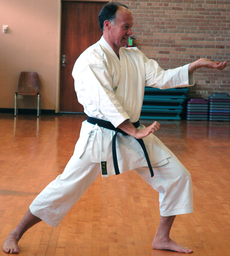Aside from working as an oncologist at Thibodaux General Medical Center, James Ellis teaches the Japanese martial art of shotokan karate to students at Nicholls.
Q: When did you first start practicing karate?
A: “I started in college, 1981.”
Q: When did you get your black belt?
A: “In June 2004. I was out for a while then I started back in 2000.”
Q: What first got you interested in martial arts?
A: “I was involved in a lot of sports and had friends who did karate, then I saw a demonstration at LSU.”
Q: Why should students practice?
A: “It’s a good form of physical fitness.”
Q: Why do you practice karate?
A: “I like it. I practice it for health. It’s an enjoyable activity and a good workout.”
Q: What distinguishes karate from other martial arts?
A: “It’s a Japanese style of martial arts called a hard-style, which means low stances.”
Q: And what distinguishes shotokan karate from other karate styles?
A: “The low stances and strong focus separate it from other styles.”
Q: How did you come about teaching the Nicholls karate class?
A: “Five years ago faculty and friends asked me to start a club, and the class grew out of the club. The class has been around for five years.”
Q: Are there any karate organizations or events on campus?
A: “The karate class is part of the Japanese Karate Association, and there is a national tournament in November. Some of our students will attend.”
Q: What are some common misconceptions you often hear about karate?
A: “Sometimes, people think it’s all about fighting, but it’s more about self-defense and self-discipline. I think a lot of people watch movies and think it’s all magic.”
Q: Have you ever needed to use karate in a practical situation to defend yourself?
A: “Not yet.”
Q: Do you think karate gives students the confidence to defend themselves?
A: “Yes, that’s definitely one of the goals of it.








